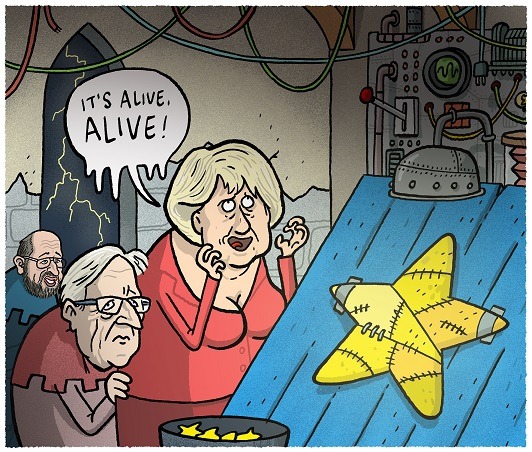It is often said that the Chinese word for crisis is composed of the characters for “danger” and “opportunity”. In a similar vein, President Barack Obama’s first chief of staff, Rahm Emmanuel, argued that “you never want a serious crisis to go to waste.” And in Europe the notion that crises provide opportunities for further integration is so deeply ingrained that it is known as the (Jean) Monnet method.
Unsurprisingly, then, the conventional wisdom in Brussels is that, with the eurozone trapped in a seemingly never-ending crisis, much deeper integration is needed: a fiscal and political union, to complete the monetary one. But what if this time is different? What if deeper integration, if it is achievable at all, would actually be a mistake?
You may think eurozone leaders have more pressing things to worry about. Even with the benefit of quantitative easing by the European Central Bank, low oil prices, a weak euro and a pause to fiscal austerity, the eurozone economy grew by a mere 0.3% in the second quarter of this year. It remains 1.3% smaller than in early 2008, while one in nine people are unemployed.
Yet the debate about the future governance of the eurozone is set to dominate discussions in Brussels in the coming months, because the German government’s actions over Greece have profoundly destabilised the eurozone.
Europe’s monetary union is meant to be irrevocable. There is no provision in the EU Treaty for euro exit. While prospective members that comply with the entry conditions are welcome to join, there are no exit conditions: once you’re in, you’re in. But that all changed at an emergency eurozone summit weekend in Brussels in early July. Germany’s finance minister, Wolfgang Schäuble, officially proposed that Greece leave the euro (ostensibly temporarily) unless it complied with Berlin’s demands.
Schäuble’s shock move provoked a shouting match with the normally ice-cool ECB president, Mario Draghi. Remember that it was Draghi’s pledge to do “whatever it takes” to hold the euro together which finally quelled the panic that threatened to destroy the single currency in the summer of 2012.
Yet suddenly Schäuble was suggesting that countries could be ejected from the euro after all. That would, in effect, transform the monetary union into a very rigid and dangerously unstable fixed-exchange-rate system: one which countries could be forced to leave, at huge cost, in a crisis.
For now, the threat of Grexit has been avoided. Frantic French efforts to keep Greece in the euro succeeded, after Athens submitted to Germany’s punitive terms. But like threatening divorce in a bitter marital dispute, what’s said cannot be unsaid.
Indeed, far from backtracking, the German Council of Economic Experts, which advises Chancellor Angela Merkel’s government, has suggested formalising Schäuble’s proposal: any country that breaches the fiscal rules and “continually fails to cooperate” should exit the monetary union. The message to those tempted to defy the German line could scarcely be clearer.
Such a Germanic euro is unacceptable to many Europeans, not least in Paris and Rome. France’s president, François Hollande, has instead called for a democratically accountable eurozone government. Italy’s finance minister, Pier Carlo Padoan, has echoed the French call for a fiscal and political union.
Any proposal with the word “union” in it goes down well in Brussels. But a reality check is needed. There was little support for a federal eurozone government even before the crisis. And now that a financial crisis pitting creditors (the banks) against debtors has become a political conflict between countries, with nationalist insults flying and EU institutions discredited by siding with the creditors, European common feeling is in tatters. With the best will in the world, it is scarcely conceivable that Germans and French people could happily share a government, let alone Germans and Greeks.
There is manifestly little appetite among Europeans for further integration right now. It’s been a decade since the French and the Dutch voted No to the EU constitution and they have become much more sceptical since then.
A recent survey by Opinium Research finds that the Dutch are almost as wary of deeper integration as the British, who will be soon voting on whether to leave the EU, while the French are close behind. A mere 17% of Dutch people and 24% of French ones favour further steps towards “ever closer union”, while 42% of Dutch people and 32% of French want to repatriate powers from Brussels. So forget about winning a referendum on steps towards a eurozone government.
Even if eurozone leaders could somehow impose their will on reluctant Europeans, the fiscal union that would emerge would hardly be along Franco-Italian lines. Their vision involves a eurozone Treasury that could provide an economic stimulus in recessions and invest in long-term growth, financed by commonly issued debt. Conveniently, this would also cage German power.
In contrast, the German vision involves a supranational fiscal enforcer that could keep borrowing in check and rewrite national budgets at will. With Berlin in the driving seat as creditor-in-chief, which vision seems more likely to prevail? Is that really what Paris and Rome want?
Perhaps it is time to think along different lines. Instead of trying to impose a single fiscal model on everyone, why not allow diversity to flourish? If Germans want to prioritise zero government borrowing above all else – even if that means letting their bridges crumble, their canals clog up, their broadband internet connections crawl, and their universities sink further down the global rankings – they should be free to do so. And others should be free to make different fiscal choices.
The standard objection to allowing such fiscal flexibility is that if France borrows too much, this will push up German interest rates. But during the crisis, the opposite has happened: cash has flowed to Germany as a safe haven, pushing rates down.
A further objection is that because of eurozone governments’ loans to Greece, Ireland, Portugal and Spain, and the creation of a permanent bailout fund, the European Stability Mechanism (ESM), German taxpayers could end up liable for everyone else’s debts. (Never mind that those eurozone loans were in fact covert bailouts of German and French banks.) So why not restore the Maastricht Treaty’s no-bailout rule?
To make it credible that governments will not bail out their peers, a mechanism for restructuring the debts of insolvent governments should be created. So, no repeat of the loans to Greece in 2010. To prevent banks loading up on risky government debt, easing fiscal discipline and putting them at risk when a government runs into trouble, bank regulation ought to stop incorrectly treating all government debt as risk-free and cap how much banks can buy.
The eurozone could then have much looser fiscal rules – or none at all. That would enable governments to borrow freely to counteract recessions and to invest – if they want to. And it would restore voters’ democratic right to elect governments that can pursue different political priorities. As they say in Germany, national liability, national control.
Ideally, the ECB would also be mandated to quell panics – and that knowledge would prevent it from ever having to intervene. And the eurozone could press on with integration where it is truly needed: developing eurozone banking systems and capital markets that safely share risks across borders.
A more decentralised, flexible eurozone makes eminent sense. It would accommodate economic and political differences, while leaving open the option of greater federalism if and when the time is right. Deeper integration is not always the solution. Far from strengthening the euro, trying to force through further centralised fiscal controls is more likely to eventually break it up.
You Never Want a Serious Crisis to go to Waste
This is an opinion article by an external contributor. The views belong to the writer.


